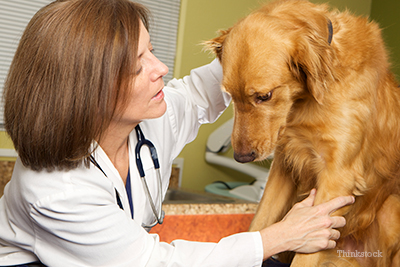Meghan Trainor’s hit song says, “It’s all about that bass.” Well, it seems, in recent years, vet-stress concerns have been, “All about that cat.” However, in a recent study released by the American Veterinary Medical Association (reported by NewSTAT), dogs too undergo considerable stress and anxiety when they go for veterinary visits.  The study looked at 36 seemingly normal, healthy client-owned dogs and measured a number of parameters when the dogs were at home and again at the veterinary facility. This study evaluated changes in vital signs when dogs traveled between the home environment and the veterinary environment. Differences were recorded between dogs in the two environments1.
The study looked at 36 seemingly normal, healthy client-owned dogs and measured a number of parameters when the dogs were at home and again at the veterinary facility. This study evaluated changes in vital signs when dogs traveled between the home environment and the veterinary environment. Differences were recorded between dogs in the two environments1.
These dogs had their respiratory rate, pulse rate, rectal temperature and systolic arterial blood pressure measured in their home environment. They were then taken to the veterinary hospital and the measurements were repeated. The changes between the two environments were significant1.
Dog anxiety at the veterinarian’s office
According to aaha.org, significant differences in blood pressure, rectal temperature and pulse rate were observed between measurements obtained in the two environments. “Mean blood pressure increased by 16%..., rectal temperature increased (by < 1%)…, and pulse rate increased by 11% …. The number of dogs panting in the hospital environment (63%) was significantly higher than the number of dogs panting at home (17%).” Panting is frequently considered an indication of stress.
Although this is an early study, and I expect more research to follow, it points out the fact that cats are not the only patients we see subject to stress.
Similar studies of human patients have revealed a similar “white coat syndrome;” an elevation of blood pressure limited to the doctor’s office. It may occur in 20% of patients, according to one source2.
While more studies are indicated to evaluate the significance of these seemingly stress-related findings, it would appear that cats are not the only pets stressed when traveling to the veterinarian. Of course, routine veterinary visits for your pet are no less important than your own visits to the doctor. Therefore, efforts should be made to reduce the stress associated with veterinary visits.
Help your dog avoid anxiety at the veterinarian’s office
Click here to learn everything you’ll need to know about reducing stress before, during and after a veterinary visit. One important tip you’ll read about is reducing the stress around car rides, and on that subject, I have some advice of my own.
Steps to get your pet accustomed to car rides:
- Some dogs get upset just getting in the car. Remember, they haven’t always had a positive experience. Begin by just putting your dog in the car with you for a few minutes. Don’t even start the car, just speak softly and pet your dog. Then let him out of the car and give him a treat. Repeat this several times daily, for a few days, until he associates getting into the car with the treat.
- When your both comfortable in the car, start the engine. Again, just sit there reassuring your dog; give him a treat. Repeat this for a couple days.
- Next, drive around a block or two and take your dog home for a treat. As your dog gets more comfortable, lengthen the drives and end them with a reward—a treat, a walk—whatever the dog seems to enjoy. A few days of this will show your dog that there are good things associated with the car.
- Drive to the veterinary clinic, but don’t take your dog in. just wait in the car and drive back home. You can walk the dog on leash, around the parking lot or just take the dog in and give him a reward.
- Schedule an appointment and take the dog into the exam room—no shots, no treatments— just a reward.
- Always end your visit to the veterinarian with a treat and, on occasion, a play period.
Granted, this will take some time and commitment, but it will do a lot to eliminate the fear factor.
Questions to ask your veterinarian:
• My dog seems to enjoy going to the veterinarian. Is he just hiding his stress?
• My dog always pants a lot when we go to the veterinarian, but never at home. Is this normal?
If you have any questions or concerns, you should always visit or call your veterinarian -- they are your best resource to ensure the health and well-being of your pets.
Resources:
- "JAVMA Study on Hospital Visit Stress on Canines Released." NewStat. American Animal Hospital Association, Web. 06 Apr. 2015.
- Pickering, TG. "Clinical Applications of Ambulatory Blood Pressure Monitoring: The White Coat Syndrome." Europe PubMed Central. Web. 06 Apr. 2015.
